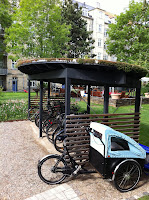The Sumner Community Group which has been doing great things in their community since the earthquakes, sent out an open invitation to meet John Buck. They sent the podcast link with Kim Hill interviewing John Buck on National Radio.
I wanted to be there.
Jacinda (one of the other Lyttel town bloggers) and I went.
The meeting was just for one hour – in that time Manfred Friedrich whose firm was sponsoring John Buck trip here introduced the concept and John ran an exercise with us using the methodology. I was hooked.
I’ve had this experience before in my life where you hear something, don’t fully understand it, but you know you have to follow through and learn more. So as I write this blog entry I am aware that I am quite naïve on the subject of Dynamic Governance or Sociocracy, but I am hungry to learn more.
As I read ‘We the People; consenting to a deeper democracy’ I can see why a lot of what we do in Project Lyttelton works so well – we are already engaged in a form of sociocracy. We could develop this far more. Often we haven’t exactly known why what we are doing works, this sociocracy explains why and also shows us how it is possible for us as an organisation to become even more successful by tapping into the knowledge, creativity and engagement of all involved.
written by Margaret Jefferies, chair of Project Lyttelton
































